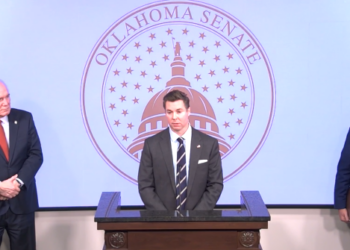OKLAHOMA CITY (OBV) – Two Oklahoma City attorneys filed a lawsuit against Gov. Kevin Stitt and legislative leaders, challenging a new law that establishes business courts.
Attorneys Joe White Jr. and Jason Waddell filed a lawsuit in the Oklahoma Supreme Court on June 26 against Stitt, Oklahoma Senate President Pro Tempore Lonnie Paxton, R-Tuttle, and Oklahoma House Speaker Kyle Hilbert, R-Bristow.
White and Waddell are petitioning the Supreme Court to declare Senate Bill 632 unconstitutional and place a permanent injunction against the creation of business courts.
SB 632 provides framework for the creation of two business court divisions headquartered at the Court of Civil Appeals in Oklahoma City and Tulsa.
Stitt, who signed SB 632 into law in June, issued the following statement in response to the lawsuit:
“This meritless lawsuit is a Hail Mary pass thrown by trial attorneys who profit from maintaining the status quo. Our business court law will make Oklahoma the most business-friendly state, in part by limiting lawsuit abuse by trial attorneys. We can’t let these trial attorneys weaponize the justice system to protect their interests. Business courts will streamline litigation and will send a powerful message nationwide that Oklahoma is open for business. If companies come here they will have certainty and fairness in our courts.”
Gov. Kevin Stitt
The attorneys state in the lawsuit that the Supreme Court must take action on the matter quickly since SB 632 goes into effect on Sept. 1.
“It is a matter of judicial economy that the Supreme Court accept original jurisdiction and consider the extraordinary and supervisory relief to prevent the creation of judicial positions 3 which Petitioners allege are created contrary to the Constitution of Oklahoma. An ordinary and usual remedy is not available to obtain judicial determination before this law takes effect,” the lawsuit states.
The attorneys contend the legislature unconstitutionally bypassed the Judicial Nominating Commission for the selection and appointment of judges for the business court and created an unconstitutional barrier to access to the courts with a $1,565.00 filing fee.
The lawsuit asks the Supreme Court to issue a temporary injunction to stop Stitt from appointing business court judges while the case is being decided..
Stitt announced his intention to establish business courts in Oklahoma in his first weekly news conference of the year in late January, ahead of his State of the State address and the start of the new legislative session.
“You see Delaware attacking Elon Musk’s company. It got into compensation that was negotiated by the board, so he pulled out of Delaware. You saw the court system attack President Trump’s business. I don’t want businesses to think that that could happen to them in Oklahoma. So, we’re going to set up business courts. It’s going to be live in 2026. I’m really excited about that,” Stitt said in January.
Stitt said the passage of Senate Bill 473 last year, which pursues the creation of business courts, showed major companies looking to expand into a new state that Oklahoma is a place where companies receive fair and expedient treatment in the courts.
SB 473 allowed for the establishment of a task force dedicated to pursuing the creation of business courts in Oklahoma.
The intention for business courts is to resolve intricate commercial disputes in a fast, efficient manner that is cheaper for businesses.
SB 632 does the following in pursuit of establishing business courts in Oklahoma:
- Directs the Oklahoma Supreme Court and business court judges to promulgate rules for the implementation and administration of business courts;
- Authorizes business court judges to appoint a secretary-bailiff, law clerk and other personnel who will work in the business courts;
- Sets the salary for a business court judge at the same pay as an associate judge of the
Supreme Court; - Sets the term for business court judges at eight years;
- Outlines the qualifications to serve as a business court judge, which includes being at least 35 years of age, being a United States citizen and having at least 10 or more years of legal experience;
- Outlines the business court judge appointment process, which begins with the speaker of the Oklahoma House of Representatives providing the governor with a list of three candidates, the governor choosing an appointee from the list and the Senate confirming the appointment;
- Allows the governor to reject the list of appointees from the speaker and request a subsequent list. The list must be provided to the governor within 40 days of the request or the governor can appoint any person that meets the statutory qualifications to serve;
- States that an appointed business court judge will serve on a interim basis if the appointment is made when the Legislature is not in session;
- Requires the aforementioned appointment process to be used to fill vacancies;
- Outlines the authority and jurisdiction of business courts and lists the types of cases that can be added to a business court docket beginning Jan. 1, 2026, as long as the claim amount is at least $500,000;
- Allow a jury trial if claimed by a party within the time period established by court rules;
- Requires non-jury trials to be resolved within 12 months unless an extension is requested by the disputing parties; and
- Establishes a $1500 filing fee for cases filed in business court.
The lawsuit is shared below:

















